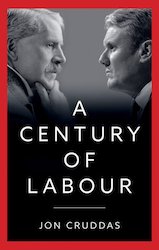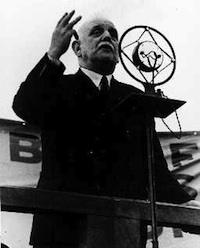Labour MP Jon Cruddas has written a sweeping history of the party over the last 100 years, assessing its record, its leaders and the ideas that underpin it. IAN BULLOCK follows the ups and downs.
The 100th anniversary of the Labour Party’s first national government in 1924 has been marked by a handful of publications, including The Wild Men, by David Torrance, a historian in the House of Commons Library, and The Men of 1924, by Peter Clark, a research associate at the University of London’s School of Oriental and Africa Studies.
 Unlike those, however, retiring Labour MP Jon Cruddas has used the occasion in his new book, A Century of Labour, to assess the party’s record, leaders and ideas from that first taste of power right up to the present day.
Unlike those, however, retiring Labour MP Jon Cruddas has used the occasion in his new book, A Century of Labour, to assess the party’s record, leaders and ideas from that first taste of power right up to the present day.
In his Preface, Cruddas asks: “Why has Labour underperformed in British politics?”, pointing out that it has only “held power for a total of 33 years” and has been led by only six prime ministers. Labour succeeds best, he says, when it combines “three visions of justice”, concerned respectively “with maximising human welfare, human freedom or human virtue”. The first two are fairly clear, but the final one is harder to get a grip on. Cruddas says it is “ethical in orientation”.
With that in mind, it’s worth noting that Labour’s first prime minister, Ramsay MacDonald, owed his position to the ILP members in the Parliamentary Labour Party who supported him in the 1922 leadership election, helping him defeat John Robert Clynes by just 61 votes to 56. The ILP would soon become a constant source of criticism and opposition to MacDonald – especially when it was under James Maxton’s leadership in the later 1920s and 1930s.
MacDonald has since become something of a hate figure for Labour members, especially those on the left, but Cruddas resists this “demonisation”. For him, MacDonald’s greatest error, made just before he formed a National Government with the Conservatives in 1931, was to reject Milton Keynes’s advice to initiate a “British New Deal”.
Significant achievements
Certainly, the two minority Labour governments of 1924 and 1929-31 had some significant achievements, including John Wheatley’s Housing Act during the first administration. Indeed, during that initial foray into power, MacDonald received praise from some unlikely quarters, including Alexander Thompson.
 As editor of the Clarion alongside Robert Blatchford, Thompson had accused MacDonald and other ILP anti-war campaigners during World War I, of being “pro-German”. But on 17 October 1924, towards the end of the first Labour government, Thompson wrote under the headline, ‘What MacDonald has done’, of the leader’s role in “The pact of London” – a new plan for settling post-war German reparations – saying it “crowned a series of diplomatic master-strokes which converted my wartime distrust of Ramsay MacDonald to respect and approval”.
As editor of the Clarion alongside Robert Blatchford, Thompson had accused MacDonald and other ILP anti-war campaigners during World War I, of being “pro-German”. But on 17 October 1924, towards the end of the first Labour government, Thompson wrote under the headline, ‘What MacDonald has done’, of the leader’s role in “The pact of London” – a new plan for settling post-war German reparations – saying it “crowned a series of diplomatic master-strokes which converted my wartime distrust of Ramsay MacDonald to respect and approval”.
But if Cruddas has time for MacDonald, he has more for George Lansbury (pictured above), Labour leader from 1932 to 1935, and even more for Clement Attlee who, he says, led Labour when it best embodied a combination of those “three visions”. He concludes a chapter headed ‘Jerusalem’ on Attlee’s post-1945 government with unequivocal approval, writing: “Under his understated leadership, Labour transformed the nation through successfully uniting the three traditions of justice that define the party’s history.”
I was particularly pleased that Cruddas makes clear Attlee’s commitment to the ILP. (For more on this, including details of Attlee’s co-operation with pacifist Clifford Allen in the early 1920s on a scheme to change the ILP’s constitution, see my book, Under Siege.) Attlee, of course, joined up in 1914, was badly wounded on more than one occasion, and ended the war as a major. During the interwar period he was referred to as ‘Major Attlee’. But this didn’t stop him being close to the anti-World War I ILPers nor from voting for MacDonald in that post-war leadership election.
The chapter on the 1964 to 1979 period is aptly headed ‘Strife’. I well remember briefly leaving Labour just before the 1970 election because I was angry about Harold Wilson’s lack of radicalism, not appreciating at the time his achievement in keeping us out of the Vietnam war.
I was reminded of this in 2003 when I mistakenly thought Tony Blair too intelligent to support President George Bush’s Iraq invasion. Until a fortnight before the million-strong demo against the war, which my wife and I took part in, I was convinced he was just stringing Bush along, hoping to eventually dissuade him. Certainly, the Iraq issue damaged Blair’s standing in the party, as Cruddas acknowledges.
He goes on to credit Gordon Brown, together with Alistair Darling, for “pulling together the international response [to the banking crisis], the highpoint of his tenure at 10 Downing Street”, even though the economy still “fell of a cliff”. And he regards Ed Miliband’s “successful ‘One Nation’ speech” at the 2012 party conference, as a moment of promise that was never fulfilled.
Bruising events
Cruddas sees the period of Jeremy Corbyn’s leadership as aligning “the remaining survivors of the 1980s hard left with a new generation of activists radicalised after the financial crash and the student protests of the early 2010s”.
This is probably right, although Corbyn’s earlier support for Militant was enough to deter me from voting for him. I lived in a ward controlled by that faction and party meetings were bruising events. In the end I voted for Yvette Cooper as the least worst option, without any real evidence.
At the time of the 2017 election, I thought Labour did better than expected because people had voted to prevent it being wiped out. But then it was pretty much wiped out anyway in 2019.
Cruddas is fully aware of the role of chance in Labour’s story. If Hugh Gaitskell and, much later, John Smith had not died so prematurely then things could have been very different. If ILP parliamentarians had not backed MacDonald back in 1922, Clynes would likely have won. If the US Supreme Court had not ruled by five to four in favour of Bush rather than Al Gore after their US presidential battle in 2000, Blair might not have been led into the mire of Iraq.
Any reasonable account of Labour over the last 100 years has to acknowledge these counterfactuals and take them into account. Which brings us, finally, to the current Labour Party leadership. Cruddas writes: “By early 2024, Labour looks to be on the cusp of a victory, although the character of the modern party and its leader is vague and the policy perspective has been dramatically truncated.”
He identifies “four pivots” taken by Keir Starmer since he became leader in 2020 – away from “his early commitment to internal pluralism, from his 10 campaign pledges, a pivot back to supply-side socialism of the early 1990s, and a shift away from Labour’s tradition of liberalism”.
I’m now 83 years old. I have lived through all the Labour governments apart from the minority ones, and I share some of Cruddas’s doubts about the current leader. I just hope Starmer is so determined to become PM that he is deliberately leaving a very small target for opponents, that things may pivot back a little once Labour’s in power. Certainly, anything would be an improvement on the current government.
—-
A Century of Labour, by Jon Cruddas, is available from Polity Books for £25.
Ian Bullock is a historian of the early socialist movement and Friend of the ILP. His website on socialism and democracy is here.
He is the author of numerous works on Labour history, including Democratic Ideas and the British Labour Movement, 1880-1914 (1996) with Logie Barrow, Romancing the Revolution: The Myth of Soviet Democracy and the British Left (2011), Under Siege: The Independent Labour Party in Interwar Britain (2018), and The Drums of Armageddon (2021).
His most recent work is The Valley of Dry Bones: The Clarion during the First World War, which can be read on his website.


